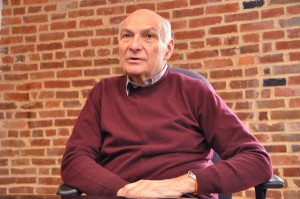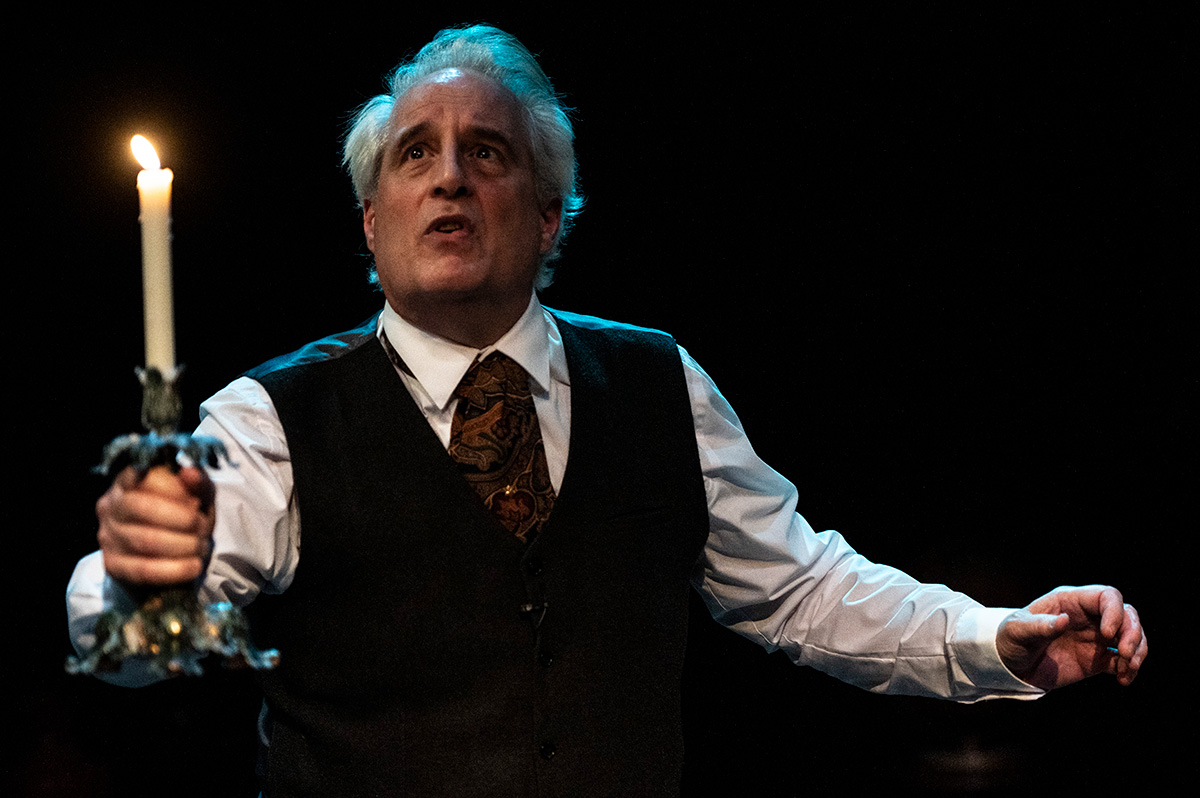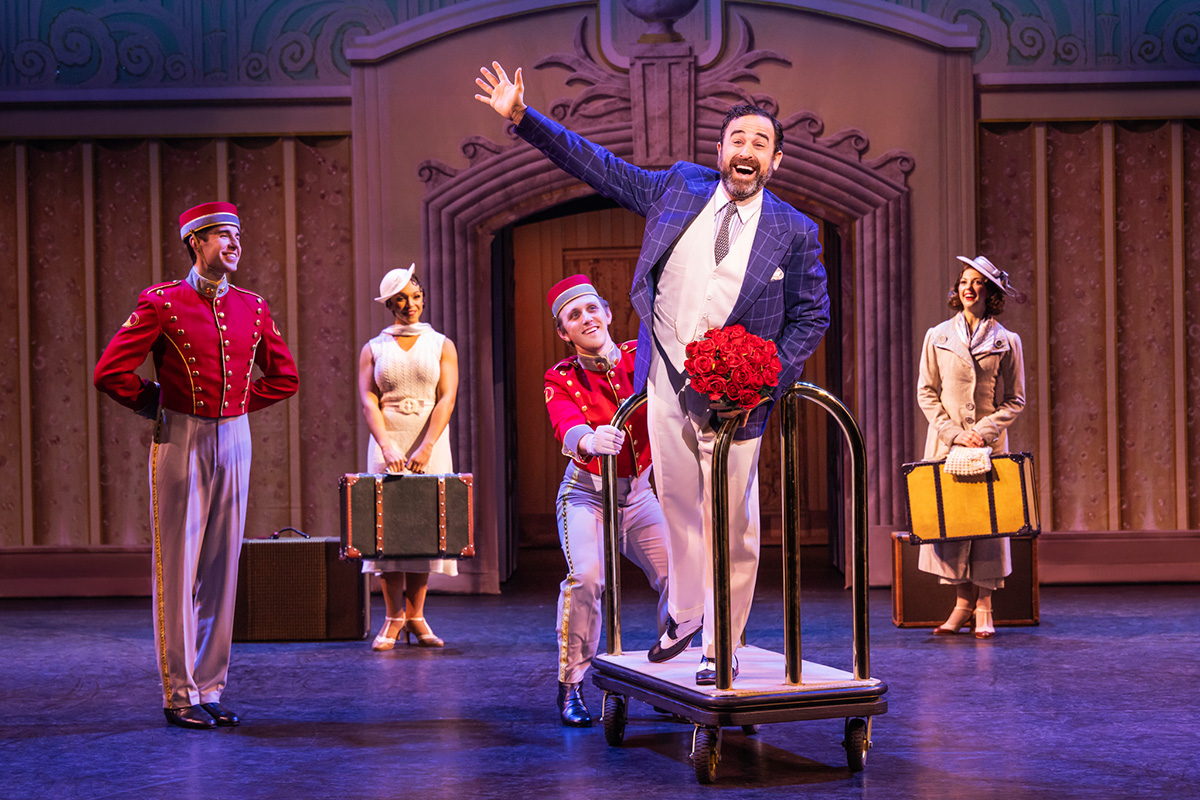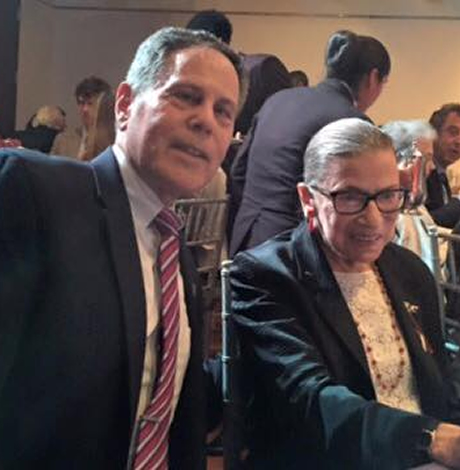Theater
The path of Kahn
Keeper of the classics celebrates 25 years directing theater in D.C.

Michael Kahn has a long reputation of making classical theater accessible to contemporary audiences. He’s celebrating 25 years in town this month. A party is planned for October. (Blade photos by Michael Key)
When Michael Kahn came to Washington in 1986, he intended to stay for two years tops. The plan was to share his theater expertise for a while and then get back to his life in New York and continue teaching and staging plays and operas.
But luckily for local theatergoers, things played out very differently. Instead, Kahn remained in town as artistic director of the Shakespeare Theater Company (STC) where he’s currently gearing up for the classical troupe’s 25th anniversary season.
Seated at a long conference table in STC’s busy administration offices on Capitol Hill, Kahn explains how he initially came to D.C. to help save the then-failing Folger Theatre and stayed on when he was named artistic director of a newly created Shakespeare Theatre at the Folger. Later he orchestrated the Shakespeare Theatre’s move to the larger Landsburgh location, adopted the STC name and more recently helped to expand the company’s home with the grand 775-seat Sidney Harman Hall.
“I took the job happily but not for a moment along the way did I think I was in for the long haul,” says Kahn, who is gay. “I’d think about leaving but then something interesting would always come up — an expanded season, the educational program, the STC Free-For-All [a terrific Washington tradition that annually offers free performances of a Shakespearean classic to the general public] and, or course, I’m glad I stuck around.”
Over the years, Kahn has successfully pursued STC’s core mission of doing classic theater “in an accessible, skillful, imaginative, American style that honors playwrights’ language and intentions while viewing their plays through a 21st-century lens.” In doing so, he’s created arguably the nation’s premier classical company and emerged as one of America’s foremost directors of Shakespeare.
Kahn alone selects the STC’s titles and directors. For the upcoming milestone season that kicks off in late August, Kahn wants to make things a little special. In addition to seven plays (a mix of dramas and comedies), he plans to celebrate the Bard with a pair of musicals performed in concert-style staging: Rodgers and Hart’s “The Boys from Syracuse,” a late-1930s swing version of “The Comedy of Errors;” and John Guare’s rock opera “Two Gentlemen of Verona.”
As a special anniversary treat to himself, Kahn will direct Eugene O’Neil’s “Strange Interlude,” a famously difficult play about love and deception that he’s longed to stage for years. He also plans to work with some of his favorite actors (many of whom can’t be named until contracts are signed), as well as two former STC associate directors who’ve made good outside of the nest – P.J. Paparelli (artistic director of Chicago’s American Theater Company since 2007) and successful New York-based freelance director Ethan McSweeny — who’ll stage “The Two Gentlemen From Verona” (the original non-musical) and “Much Ado About Nothing,” respectively.
D.C. native McSweeny met Kahn while still a secondary student at St. Albans School. He invited the director to speak to his drama club and Kahn agreed. During college and after, he interned with Kahn at STC, and at just 22, he was named the company’s resident assistant director.
“My four years at STC were graduate school for me,” McSweeny says. “I think directing is a craft that’s learned from watching a master craftsman like Michael in action. He doesn’t dictate. He just does it.
“Michael is also a tough teacher. With him, you’ve got to bring your A game,” McSweeny adds. “We alums of Kahn all maintain high standards — we inherited that from Michael. But in addition to the stick there’s the carrot: Michael can be a torrent of creative passion and it’s thrilling to be in the vortex with him.”
The school of Kahn isn’t reserved exclusively for promising directors. Actors have benefited as well. Via phone from New York, Veanne Cox, a delightful, versatile actor who rapidly has become an STC regular, recounts how six or so years ago Kahn happened to catch her playing the very dramatic part of a woman dying from cancer, and afterward matter-of-factly commented that she was made for Restoration Comedy. The story still makes Cox laugh, and she is quick to add that soon after Kahn cast her in STC’s production of the classic comedy “The Beaux Stratagem” and changed her life.
“Prior to knowing Michael I’d done very little classical theater,” Cox — who memorably appeared as the heckler in a “Seinfeld” episode — says. “Because of him, my career is flourishing in new ways. My best work experiences have been at STC, better than Broadway and off-Broadway. [In the fall, Cox is slated to return to STC as Beatrice in “Much Ado About Nothing.”] The actors are exquisite to work with, and D.C. audiences are better educated than New York audiences about the works. Because of Michael, they understand language and themes. He has trained them how to appreciate and understand classical theater.”
STC is not Kahn’s first act, far from it. He began his career in New York in the ‘60s, directing for gay playwright Edward Albee and Joseph Papp’s Shakespeare in the Park. His Broadway successes include revivals of “Showboat,” “The Royal Family” and “Cat on a Hot Tin Roof (starring a young and gorgeous Elizabeth Ashley). He’s also earned excellent reviews staging opera and regional theater. Before coming to Washington, he was artistic director for the American Shakespeare Theatre in Stratford, Conn.; producing director for the McCarter Theatre; and founder and head of The Chautauqua Conservatory Theater. In addition, Kahn maintained a parallel career as an educator, commuting to Manhattan as head of the Drama Division of New York’s prestigious Juilliard School until 2006. He has won multiple Helen Hayes Awards for his STC work, and is frequently honored by the LGBT community.
Repeatedly, Kahn’s skills and impressive vitae have and continue to lure well-known actors like Elizabeth Ashley, Stacy Keach, Kelly McGillis and the late Dixie Carter to STC. He enjoys working with big names. Usually, Kahn says, big names become famous because they’re good.
“Well, not always,” he backtracks. “Anyone who waits in line at a supermarket can’t help but know Kim Kardashian, but that doesn’t mean I’ll be working with her any time soon.”
Growing up in Brooklyn as an only child with “all the vices and problems that that entails,” Khan was just 5 when his Russian immigrant mother introduced him to the works of Shakespeare. He attended High School for the Performing Arts and went on to Columbia University where he directed plays for the French club (a pre-famous Andy Warhol designed the set for one of the productions). Kahn came out early. He never struggled with his sexual orientation, only unrequited love. As a young man he carried an unreciprocated torch for gay playwright Terrence McNally. He outed himself to the Washington Post in 1986 and believes a lot of conservative society’s problems with the arts is, in fact, subterranean homophobia. Lately he’s come to the conclusion that good direction requires sensitivity, and whether it comes from a gay or straight person makes little difference.
Kahn says it’s possible to have a relationship despite an all-consuming professional life, but you pay a price: “With me here and Frank [Donnelly, Kahn’s late, longtime partner] in New York, we were often apart. I wasn’t there when he died.” A psychotherapist, Donnelly died in his sleep shortly after 9-11. He’d spent his last days counseling those who had lost loved ones in the World Trade Center collapse.
When asked if he’s in a relationship now, Kahn replies playfully, “Yes, at least that’s what it says on Facebook.”
And does he miss working in New York?
“I could never do in New York what I do here,” he says. “I’d be in a 200-seat theater with a much smaller budget. They’re just not interested in lesser known shows like Musset’s ‘Lorenzaccio” from our [2005] season, or David Ives’ adaptation of Regnard’s 1706 masterpiece ‘The Heir Apparent’ that we’re doing in the fall.”
Highfalutin legacy talk isn’t Kahn’s style; however, he will say that he “really wants to make sure the theater is in a good financial position so anyone who wants to take over [his] job will also want to stay.” But for today, Kahn continues doing what he does best — thinking of ways to bring more high quality, classical theater to Washington.
Theater
D.C. theater scene has something for everyone this holiday season
‘Nutcracker,’ ‘A Christmas Carol,’ and much more

With its familiar music, yuletide imagery, and storytelling, theater can be a big part of the holidays. Add to that making memories and theater tickets wrapped as presents under the tree, and it’s a seasonal no brainer.
Folger Theatre presents “Resplendent Joy: Christmas Traditions from Spain and Portugal” (Dec. 5-14); the marvelous Folger Consort will perform early Spanish Christmas carols and traditional holiday music from early modern Spain and Portugal: folger.edu/resplendent
At Round House Theatre, playwright Sam Holcroft’s “Rules for Living” (Dec. 3-Jan. 4) makes its U.S. premiere. The darkly funny holiday comedy was a hit in London and is now hoping to repeat that success with a version tailored for the states. The seven-person cast includes versatile actors Naomi Jacobson and real-life spouse John Lescault. Ryan Rillette directs. roundhousetheatre.org
Theatre J presents “Chanukah in the Dark” (Dec. 6-21), an hour-long play ideal for ages five and up. “When the lights go out during Chanukah, Max and family begin sharing songs, stories, and traditions — only to discover the lights they needed and the miracles they searched for were in their midst all along.” edcjcc.org
The Cathedral Choral Society’s “Joy of Christmas” (Dec. 13-14) presents a wonderful program of carols and beloved holiday favorites at the festively decorated National Cathedral. The program features Seraph Brass, organist Edward Hewes, Carillonneur Edward M. Nassor, percussionist Mary La Blanc of “The President’s Own” U.S. Marine Band, and the Eastern Concert Choir from Eastern Senior High School. Cathedralchoralsociety.org
With “The Holiday Show,” (Dec. 13, 14, and 20), the Gay Men’s Chorus returns to entertain audiences with its annual and most popular show.
This year the holiday extravaganza is bigger than ever at historic Lincoln Theatre with new, soulful arrangements of favorite holiday carols: “The reindeer will be high-kicking and the snowflakes will sparkle. Songs include “O Holy Night,” “Rudolph the Red Nosed Reindeer,” “Let It Snow,” “We Wish You the Merriest,” and “Go Tell It on the Mountain.’” gmcw.org
At Olney’s intimate Mulitz-Gudelsky Theatre Lab, out actor Michael Russotto is back for the holiday season in his solo show “Christmas Carol: A Ghost Story of Christmas” (through Dec. 28). The talented Russotto portrays nearly 50 different characters from the Charles Dickens classic, that proves “funnier and far more relevant than you might imagine.” Olneytheatre.org
Also on holiday offer in the DMV are a jolly bunch of musical chestnuts as well as reliable Christmas crowd-pleasers.
Included on the roster is Olney Theatre’s production of Jerry Herman’s “Hello, Dolly!” (through Jan. 4) starring the mega-talented Nova Y. Payton. Based on the play “The Matchmaker” by famed gay playwright Thornton Wilder, the musical has proved a vehicle for many a diva including Carol Channing, Pearl Bailey, Bette Midler, and Barbra Streisand. Now Payton dons the mantle and the buzz is good.
Another beloved musical is “Fiddler on the Roof” (through Jan. 25), the story of Tevye, a poor Jewish milkman, his family and their tight-knit community who honor tradition while contending with pogroms in Czarist Russia. Currently being performed intimately in the round at Signature Theatre in Arlington and directed by Joe Calarco, the large cast features actors Douglas Sills, Chrisopher Bloch, and terrific out actor Jake Loewenthal as the poor tailor Motel Kamzoil, all singing Broadway favorites like “Sunrise, Sunset” “If I Were a Rich Man” and “Matchmaker.” sigtheatre.org
At Shakespeare Theatre Company’s Harman Hall is Frank Loesser’s “Guys and Dolls” (through Jan. 4). Based on tales from famed American journalist Damon Runyon, the show focuses on two overlapping love stories set in Depression-era Times Square. The terrific score includes songs like “Luck Be a Lady,” “Sit Down, You’re Rockin’ the Boat,” “A Bushel and a Peck,” and more songs you’ll know. Directed by Francesca Zambello and choreographed by Joshua Bergasse.
The cast includes Julie Benko, Lamont Brown, and Holly Twyford as General Matilda B. Cartwright, which is reason enough to buy a ticket. shakespearetheatre.org
And for hardcore traditionalists there’s the Washington Ballet’s “The Nutcracker” (through Dec. 29) with its balletic magic at the charming gilded Warner Theatre. The beloved production of Tchaikovsky’s ballet, here set in 1882 Georgetown, features a retinue of agile partiers, children, soldiers, rats, and notable figures from American history. washingtonballet.org
And last but hardly least, historic Ford’s Theatre presents “A Christmas Carol” (through Dec. 31), an enduring Washington tradition since I was youngish. Conceived by Michael Baron, this charming Dickens’ moneymaker again spotlights Craig Wallace as miserly Ebenezer Scrooge who after a night of ghostly visits, rediscovers Christmas joy. Fords.org
Theater
New take on ‘Some Like It Hot’ offers diverse casting
National Theatre production includes non-binary character

‘Some Like It Hot’
Nov. 25 – Dec. 7
The National Theatre
1321 Pennsylvania Ave., N.W.
Tickets starting at $67
Broadwayatthenational.com
For more than a year, out actor Edward Juvier has been part of the national tour of “Some Like It Hot,” the musical adaption of the 1959 classic comedy starring Marilyn Monroe and written and directed by Billy Wilder.
Juvier, 49, plays Osgood Fielding III, a cheery millionaire in Depression-era America.
With music by Marc Shaiman, lyrics by Scott Wittman and Shaiman, and a book by Matthew López and Amber Ruffin, the 2022 musical is quite different as well with diverse casting, increasingly complicated backstories, and a non-binary character (Daphne).
A talented tenor and Houston native, Juvier is a Cuban American who’s been working in musical theater since graduating from the Boston Conservatory in 2000.
“I personally love touring,” says Juvier. “I like the life on the road and visiting these old theater houses across the country. Seeing the locals that I remember and my friends and family that live all over. For me, a transient life is great. Maybe not so great for others.”
Early in his career, he toured with “Phantom of the Opera” for six years. He began in the ensemble and covered two principal roles, and moved to swing which gave him the longevity covering 11 different roles in that show, a life-changing gig that he remembers fondly.
WASHINGTON BLADE: As a gay actor touring in a hot musical with some queer themes do you feel that you make an impact?
EDWARD JUVIER: Oh yeah, it’s important for queer people to see representation on stage. Our version of the show is a sneak attack; it doesn’t hit you over the head with themes. Seeing an old story that takes a turn where you’re left to accept what’s happening onstage and by that time, you’re in love and rooting with the characters. You feel it from the audiences and we play some of the reddest of states.
Queer, trans, nonbinary people meet us at the stage door in tears thanking us for the representation. They didn’t even know when they came to the show that they’re going to see something with such an affirming message to their lives, and they’re thrilled when they find that out.
BLADE: How were you drawn into musical theater?
JUVIER: I was lucky that my Texas high school made annual trips to New York to see Broadway shows. On one trip, I remember seeing “Will Rogers Follies,” I felt like Keith Carradine was looking and talking right to me.
And the next day, we saw “Falsettos,” the original production. After seeing those two very different shows it was as if I blasted off into the Broadway world.
BLADE: Did “Falsettos,” a musical about AIDS, resonate with you as young gay student?
JUVIER: Absolutely. It shook me to the core.
BLADE: Has being gay made you a better actor?
JUVIER: I think what makes a great actor is somebody who has enormous empathy, able to put themselves in someone else’s shoes, and what better than a queer artist to be able to empathize.
I came out pre- “Will and Grace.” A different time to be coming out than it is now, which shows immense progress but also put us through challenges. It’s been a part of my journey.
I’m lucky to have the best, most supportive family. No Trumpers to deal with when I go home for the holidays. So, I’m grateful for that especially at this time of year.
BLADE: How do you approach a comic character like Osgood.
JUVIER: I approach him with honesty and simplicity and try to get out of the way of cheap jokes.
When I’m feeling that I’m pushing myself I remind myself to just say the words. I think the musical is so beautifully crafted in a way to brings the show to a new audience. Changes aren’t a diss on the original but the world has changed.
BLADE: Are you a big fan of the original?
JUIVIER: I respect the original. It’s been with me all my life especially being a queer artist. We grew up watching “Some Like It Hot.” This takes old themes and jokes that don’t land so well and brings it to a new audience.
Particularly with my role played originally and so brilliantly by famed comedian Joe E. Brown. In the movie he’s not a multi-dimensional character. He’s more of an old, rich pervy guy. That’s just how it was back then. And I’ve had the great privilege to play him differently.
Theater
Gay, straight men bond over finances, single fatherhood in Mosaic show
‘A Case for the Existence of God’ set in rural Idaho

‘A Case for the Existence of God’
Through Dec. 14
Mosaic Theater Company at Atlas Performing Arts Center
1333 H St,, N.E.
Tickets: $42- $56 (discounts available)
Mosaictheater.org
With each new work, Samuel D. Hunter has become more interested in “big ideas thriving in small containers.” Increasingly, he likes to write plays with very few characters and simple sets.
His 2022 two-person play, “A Case for the Existence of God,” (now running at Mosaic Theater Company) is one of these minimal pieces. “Audiences might come in expecting a theological debate set in the Vatican, but instead it’s two guys sitting in a cubicle discussing terms on a bank loan,” says Hunter (who goes by Sam).
Like many of his plays, this award-winning work unfolds in rural Idaho, where Hunter was raised. Two men, one gay, the other straight (here played by local out actors Jaysen Wright and Lee Osorio, respectively), bond over financial insecurity and the joys and challenges of single fatherhood.
His newest success is similarly reduced. Touted as Hunter’s long-awaited Broadway debut, “Little Bear Ridge Road” features Laurie Metcalf as Sarah and Micah Stock as Ethan, Sarah’s estranged gay nephew who returns to Idaho from Seattle to settle his late father’s estate. At 90 minutes, the play’s cast is small and the setting consists only of a reclining couch in a dark void.
“I was very content to be making theater off-Broadway. It’s where most of my favorite plays live.” However, Hunter, 44, does admit to feeling validated: “Over the years there’s been this notion that my plays are too small or too Idaho for Broadway. I feel that’s misguided, so now with my play at the Booth Theatre, my favorite Broadway house, it kind of proves that.”
With “smaller” plays not necessarily the rage on Broadway, he’s pleased that he made it there without compromising the kind of plays he likes to write.
Hunter first spoke with The Blade in 2011 when his “A Bright Day in Boise” made its area premiere at Woolly Mammoth Theatre. At the time, he was still described as an up-and-coming playwright though he’d already nabbed an Obie for this dark comedy about seeking Rapture in an Idaho Hobby Lobby.
In 2015, his “The Whale,” played at Rep Stage starring out actor Michael Russotto as Charlie, a morbidly obese gay English teacher struggling with depression. Hunter wrote the screenplay for the subsequent 2022 film which garnered an Oscar for actor Brendan Frazier.
The year leading up to the Academy Awards ceremony was filled with travel, press, and festivals. It was a heady time. Because of the success of the film there are a lot of non-English language productions of “The Whale” taking place all over the world.
“I don’t see them all,” says Hunter. “When I was invited to Rio de Janeiro to see the Portuguese language premiere, I went. That wasn’t a hard thing to say yes to.”
And then, in the middle of the film hoopla, says Hunter, director Joe Mantello and Laurie (Metcalf) approached him about writing a play for them to do at Steppenwolf Theatre in Chicago before it moved to Broadway. He’d never met either of them, and they gave him carte blanche.
Early in his career, Hunter didn’t write gay characters, but after meeting his husband in grad school at the University of Iowa that changed, he began to explore that part of his life in his plays, including splashes of himself in his queer characters without making it autobiographical.
He says, “Whether it’s myself or other people, I’ve never wholesale lifted a character or story from real life and plopped it in a play. I need to breathing room to figure out characters on their own terms. It wouldn’t be fair to ask an actor to play me.”
His queer characters made his plays more artistically successful, adds Hunter. “I started putting something of myself on the line. For whatever reason, and it was probably internalized homophobia, I had been holding back.”
Though his work is personal, once he hands it over for production, it quickly becomes collaborative, which is the reason he prefers plays compared to other forms of writing.
“There’s a certain amount of detachment. I become just another member of the team that’s servicing the story. There’s a joy in that.”
Hunter is married to influential dramaturg John Baker. They live in New York City with their little girl, and two dogs. As a dad, Hunter believes despite what’s happening in the world, it’s your job to be hopeful.
“Hope is the harder choice to make. I do it not only for my daughter but because cynicism masquerades as intelligence which I find lazy. Having hope is the better way to live.”
-

 The White House4 days ago
The White House4 days ago‘Lavender Scare 2.0’: inside the White House’s campaign against LGBTQ federal employees
-

 a&e features3 days ago
a&e features3 days agoMeet Mr. Christmas
-

 District of Columbia4 days ago
District of Columbia4 days agoActivists praise Mayor Bowser’s impact on city, LGBTQ community
-

 National5 days ago
National5 days agoVictory Institute to honor Biden at D.C. conference


















